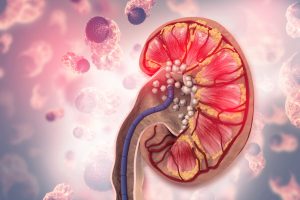 The incidence of kidney stones has been increasing in recent years due to many factors such as not drinking enough water, eating excessive salt, eating high protein diets for a long time and inactivity. Acıbadem Bakırköy Hospital Urology Specialist Prof. Dr. Acıbadem Bakırköy Hospital stated that kidney stones, which are mostly detected between the ages of 20-50 and are more common in men than in women, are a recurrent disease. Dr. Enis Rauf Coşkuner talked about the 7 wrongs that are believed to be right in the community about kidney stones, and made important warnings and suggestions.
The incidence of kidney stones has been increasing in recent years due to many factors such as not drinking enough water, eating excessive salt, eating high protein diets for a long time and inactivity. Acıbadem Bakırköy Hospital Urology Specialist Prof. Dr. Acıbadem Bakırköy Hospital stated that kidney stones, which are mostly detected between the ages of 20-50 and are more common in men than in women, are a recurrent disease. Dr. Enis Rauf Coşkuner talked about the 7 wrongs that are believed to be right in the community about kidney stones, and made important warnings and suggestions.
“50% of patients with kidney stones can re-form within 10 years. While the stones formed in the kidney are usually detected by chance and progress insidiously, the stones that move from the kidney to the urinary tract may present with a noisy picture such as severe side pain, nausea, vomiting, urinary complaints, bleeding in the urine, and fever. The pain associated with dropping a stone is considered one of the most severe pains a person can experience. The first thing to do is to clarify the diagnosis as soon as possible and to relieve the pain immediately.” says. In the treatment of kidney stone; Medical treatment for the sizes that can be reduced, extracorporeal stone breaking methods that can be applied for stones suitable for breaking, and endoscopic methods for stones that are not suitable for both, surgical intervention is applied to the stone.
“I dropped the stone, I survived!” FALSE!
TRUE: Usually, when the severe pain subsides, the patient thinks that the stone may have passed and the disease will not recur. However, the patient must be under the control of a doctor during the stone removal treatment and at the end of this period. Stating that the treatment process will not be considered complete until it is fully determined that the stone has fallen, Prof. Dr. Enis Rauf Coşkuner “If a patient who is found to have had a stone pass, has a stone that he can pass, medical abortion treatment and additional recommendations can be made.” says.
“The ideal treatment for kidney stones is to drink water!”: FALSE!
TRUE: It is undoubtedly very important for kidney stones to increase fluid intake, which is mostly met with water. However, drinking water alone is not enough for the treatment of kidney stones. It is beneficial to drink at least two or three liters of water a day. It should be kept in mind that excessive fluid intake can also have negative effects.
“Spring waters and herbal treatment are very useful in stone dropping!”: FALSE!
TRUE: Stating that medical treatment for stone must be recommended by a urologist, Prof. Dr. Enis Rauf Coşkuner says: “Everyone’s stone is unique. Information received from other acquaintances or the environment who dropped stones may cause wrong results for the person. A treatment plan should be made considering many features such as the anatomical structure of the urinary tract, the location and size of the stone, its effect on kidney functions, presence of other diseases or drug use. A miraculous water or plant that will make the stone disappear or make it easier to fall has not been scientifically proven so far. Moreover, methods with herbal ingredients and very low level of treatment evidence can lead to very serious dangers.”
“Every flank pain is caused by kidney stone!”: FALSE!
TRUE: Prof. Dr. Enis Rauf Coşkuner “Although flank pain is an important finding in stones detected in the urinary tract, this is not always the case. For this reason, differential diagnosis of other diseases that may cause pain and diseases of adjacent abdominal organs may be required. says.
 “The source of the stone is calcium. It should be restricted in the diet!”: FALSE!
“The source of the stone is calcium. It should be restricted in the diet!”: FALSE!
TRUE: Although calcium is the main component in the most common types of stones, the problem cannot be treated by restricting calcium intake. Daily calcium intake should not be lowered unconsciously. Calcium restriction can only be determined by evaluation.
“Surgery is the last resort in stone treatment!”: FALSE!
TRUE: Urology Specialist Prof. Dr. Enis Rauf Coşkuner “A urologist should decide how to plan your treatment. It would be better to leave the order of treatment or what the first treatment will be to his decision. If you have an alternative, your doctor will give you an option. But in some circumstances, the surgical method may be the first choice.” says.
“I had surgery, I will not have any more problems!”: FALSE!
TRUE: Since stone disease covers a long period in human life, the patient who has lost a stone or underwent surgery is kept under periodic control. Thus, the patient is followed up for the risk of new stone formation, and new stones detected early are treated more easily and consciously. In addition, stone analysis can be performed and measures can be taken to reduce the likelihood of stone formation by examining the patient’s blood and urine for stone formation.


